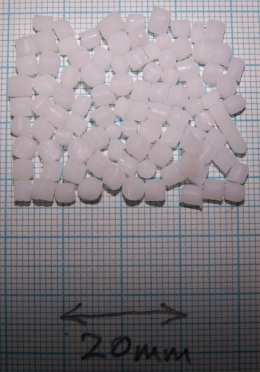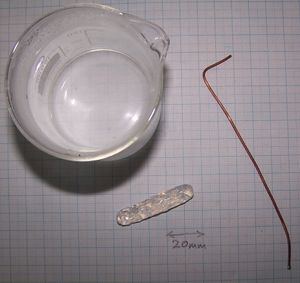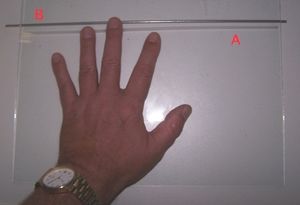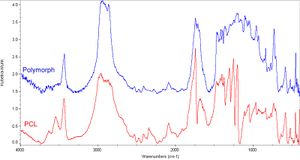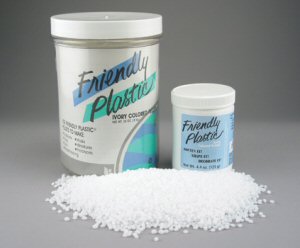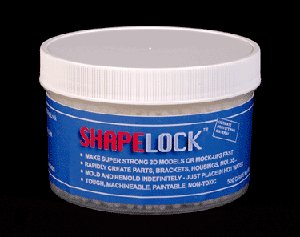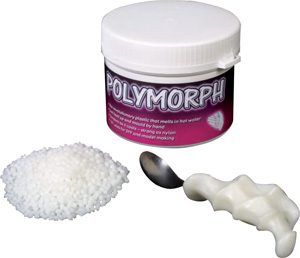Polycaprolactone
Polycaprolactone (PCL) is a biodegradable polyester with a low melting point of around 60°C and a glass transition temperature of about −60°C. More information on material properties can be found on the Wikipedia page. Trade names for PCL include Polymorph, Polydoh, Plastimake, InstaMorph, Capa, Friendly Plastic, and Shapelock.
PCL rod feed stock was one of the first raw materials extruded through a RepRap extruder. PCL is of potential interest to the RepRap community because the low melting point makes it somewhat easier to extrude. A low melting temperpature reduces the burden on the extruder, potentially allowing simpler (and thus easier to replicate) extruder mechanisms. While interesting from a research standpoint, this is not a significant design driver for the current RepRap and RepRap-like 3D printers that are available. The vast majority of low-cost 3D printers currently in operation use PLA and ABS.
PCL can be mixed with carbon black to make a printable conductive filament called carbomorph, as described in this paper: A Simple, Low-Cost Conductive Composite Material for 3D Printing of Electronic Sensors.
Contents
Uses
PCL has been used in prototype RepRap components and also demonstrated in a variety of small robotics projects.
Blob Cold End, a prototype cold end.
Android 10, a walking robot made of PCL.
Swashbot3, another PCL walking robot.
Hydraraptor makes a PCL Opto Bracket.
Some of nophead's experiments with PCL.
A good summary of PCL applications for small robots.
Buying Prefabricated Filament
Note: This is the preferred method. --Oct. 25, 2016 Nick Sears
Recent advances in tissue engineering and bioprinting as well as flexible materials has brought enough attention to the material that it can be found as a ready to print filament at reasonable prices from multiple sources
Makerbot's "Flexible Filament" although quite expensive at $130 for 1kg.
3d4makers.com has PCL filament with very well characterized mechanical and chemical properties (Mw, Mn, UTS, modulus, etc) at €76.08 for 0.75kg (Excl VAT).
eSun has PCL filament with no characterization for $32/0.5kg.
Making Polymorph Rods
Note: This is very dated material. --Sebastien Bailard 05:18, 25 June 2010 (UTC)
The extruder needs a supply of 3 mm diameter polymorph filament as input. If you can buy this cheaply, so much the better - many companies that make plastic welding rods will process quite small quantities of any thermoplastic into continuous filament.
But it is quite simple to make your own rods from Polymorph granules - the usual form in which the polymer is supplied.
To make your own rods first drill a 3 mm hole in - well, just about anything rigid; a scrap piece of aluminium about 10 mm thick is good. You will use this to pass the finished rod through to test that it is not too fat.
Next gather together the following:
- An electric kettle
- A 300 ml beaker (a clean coffee mug will do fine)
- A 3 mm diameter rod about 300 mm long to act as a reference. I used a silver-steel one, but again any rigid material will do (knitting needle etc.).
- A sheet of glass about 300 mm x 250 mm (the size is not critical, but don't make the large dimension much less than 300 mm).
- A 150 mm length of stiff wire (the single-strand copper used in house wiring is fine - in that case leave the insulation on all but the last 30 mm).
If the glass is freshly cut, smooth the edges with fine sandpaper so they will not cut you in turn.
Keep everything from here on very clean. Any bits of dust and dirt will become incorporated in the rod you make, and will then clog the extruder nozzle. This includes dirt under fingernails.
Measure out about 3 g of polymorph granules. If you can't weigh 3 g, then this is what 3 g of Polymorph looks like:
The individual granules in the picture are about 3 or 4 mm across. It's roughly half a heaped teaspoon of the stuff.
Bend the wire to form a right angle at the (insulation-stripped) end about 15 mm long. You will use this to hook the Polymorph out of the boiling water in the beaker. A metal fork will do.
Boil about 1 litre of water in the kettle, put the granules in the beaker, and pour boiling water over them. Fill the beaker about two-thirds full.
The Polymorph will melt and coagulate. Move the resulting lump about underwater with the hook to gather up any stray granules, then pull the lump out.
Using your fingers, squeeze out the hot water, and make the lump into a sausage about 50 mm long and 10 mm in diameter like this:
OBVIOUS WARNING: getting boiling water on your fingers from the Polymorph lump will scald you. Don't do it. Wait till things have cooled a little.
Now roll the Polymorph between the glass sheet and a flat surface such as a table top. When the Polymorph is hot it will squash under the glass very easily, and you will only need the lightest pressure. As it cools it will become more solid and need a greater pressure. The glass lets you see what you are doing.
ANOTHER OBVIOUS WARNING: If you push down too hard on the glass it will break, cut your hand, and spoil the rod you are making with a big red stain. Don't do that either.
Good results have been achieved using the rough side of two polypropylene chopping boards as rolling surfaces. They have a low heat capacity, don't readily stick, and grip the wet Polymorph well.
As the rod cools it will reach a point where it cannot be worked any further. It will probably look something like this:
Bend it, put it back in the beaker, reboil the kettle, and add new hot water. Take care not to let the Polymorph ends touch each other in the beaker as they will stick together. When the Polymorph is soft again take it out with the hook and repeat the rolling process. You may have to do this several times. When the diameter gets near to 3 mm, put the reference 3 mm rod (B) under the glass like this:
The Polymorph rod is labeled A. You will find that it naturally tends to roll next to the reference rod. With the fact that the glass slopes very slightly towards its bottom edge against the table, this gives a Polymorph rod slightly smaller in diameter than the reference rod (it will end up about 2.9 mm in diameter) - this is exactly what you want. (The reference rod in the picture is not bent - that's a distortion created by the wide-angle camera lens...)
Test the rod when it is cold by putting it through your reference 3 mm hole. It should not be loose, but neither should it jam. If it jams, reheat it and roll it down a bit more. If it's too loose, you've gone too far...
Chemical Information
Its strength and low melting point make it an ideal working material for the RepRap machine, and we are concentrating on devices for building with it, at least initially.
Polymorph is similar to polycaprolactone (PCL). But Jonathan Harris at Birmingham University kindly ran both through an FTIR for us:
and as you can see thare are minor differences around wavenumbers of 1100 and 3600 cm-1. I suspect that this is just a difference in molecular weight.
I (AdrianBowyer) have now (1 December 2005) obtained a sample of polycaprolactone granules and used it in place of Polymorph. It works perfectly to make rods for the RepRap extruder. I used granules of CAPA 6800 polycaprolactone (2-Oxepanone, homopolymer; molecular weight 80,000, CAS number: 24980-41-4) from Solvay Interox Ltd. (Since then, Solvay has apparently discontinued commercially manufacturing polycaprolactone).
Suppliers
USA / Canada
Missing Link - $1.33 -> 1.80 / oz
Also available on Amazon.com. Offers two different viscosities, "Standard" and "Flow" (lower viscosity).
Polydoh - $1.41 / oz with coloring granules / oz
Available from Amazon.com, comes with coloring granules.
TechTack by IC3D - $1.09 / oz
InstaMorph - $1.41 -> 0.78 / oz
Ships bulk orders world wide through their website and individual jars on Amazon.com
The Compleat Sculptor Friendly Plastic - $1.50 / oz
The Compleat Sculptor
90 Vandam Street
West SoHo
N.Y.C.
Phone: 800-9-SCULPT
Sunshine Discount Crafts - $1.25 / oz
This company also supplies Friendly Plastic in a wide range of colours.
Sunshine Discount Crafts
12335 62nd St N
Largo, FL 33773
Phone: 1-800-729-2878
ShapeLock Plastic - $1.42 / oz For Postal Service Based Orders: ShapeLock 557 East Arbor Avenue Sunnyvale, California 94085 By Email: [email protected]
Jewelry Supply.com: US$1.32/oz (US$1.16 / oz for 6+ jars)
Jewelry Supply
UK / Europe
Maplin GBP 4.00 / 100g
Maplin Electronics Ltd.
National Distribution Centre
Valley Road
Wombwell
Barnsley
South Yorkshire
S73 0BS
Sales: +44 (0)870 4296000
Polydoh - GBP 2.50 / 100g with coloring granules / oz
Available from Amazon.co.uk, comes with coloring granules.
MUTR GBP 1.40 / 100g
Middlesex University Teaching Resources (MUTR) Ltd.
Unit 10, The IO Centre
Lea Road
Waltham Cross
Herts, EN9 1AS
Tomps GBP 1.29 / 100g
Tony Maguire Plasterers Supplies t/a TOMPS
220 New Road
Sutton Bridge PE12 9QE
United Kingdom
0845 658 6677
Germany
Plaast EUR 1.70 / 100g
Plaast
Andreas Räde
Gabelsbergerstr. 7
10247 Berlin
Germany
Email: [email protected]
Polydoh - EUR 3.99 / 100g with coloring granules / oz
Available from Amazon.de, comes with coloring granules.
Australia
Plastimake AU $3 / 100g
Email: [email protected]
